‘We were around each other more than our family’: An oral history of Community
As the cult comedy series turns 15, Simon Bland talks to the people behind it – including creator Dan Harmon and cast members Alison Brie and Joel McHale – about the show’s legacy, from its beloved characters to the firings and creative clashes
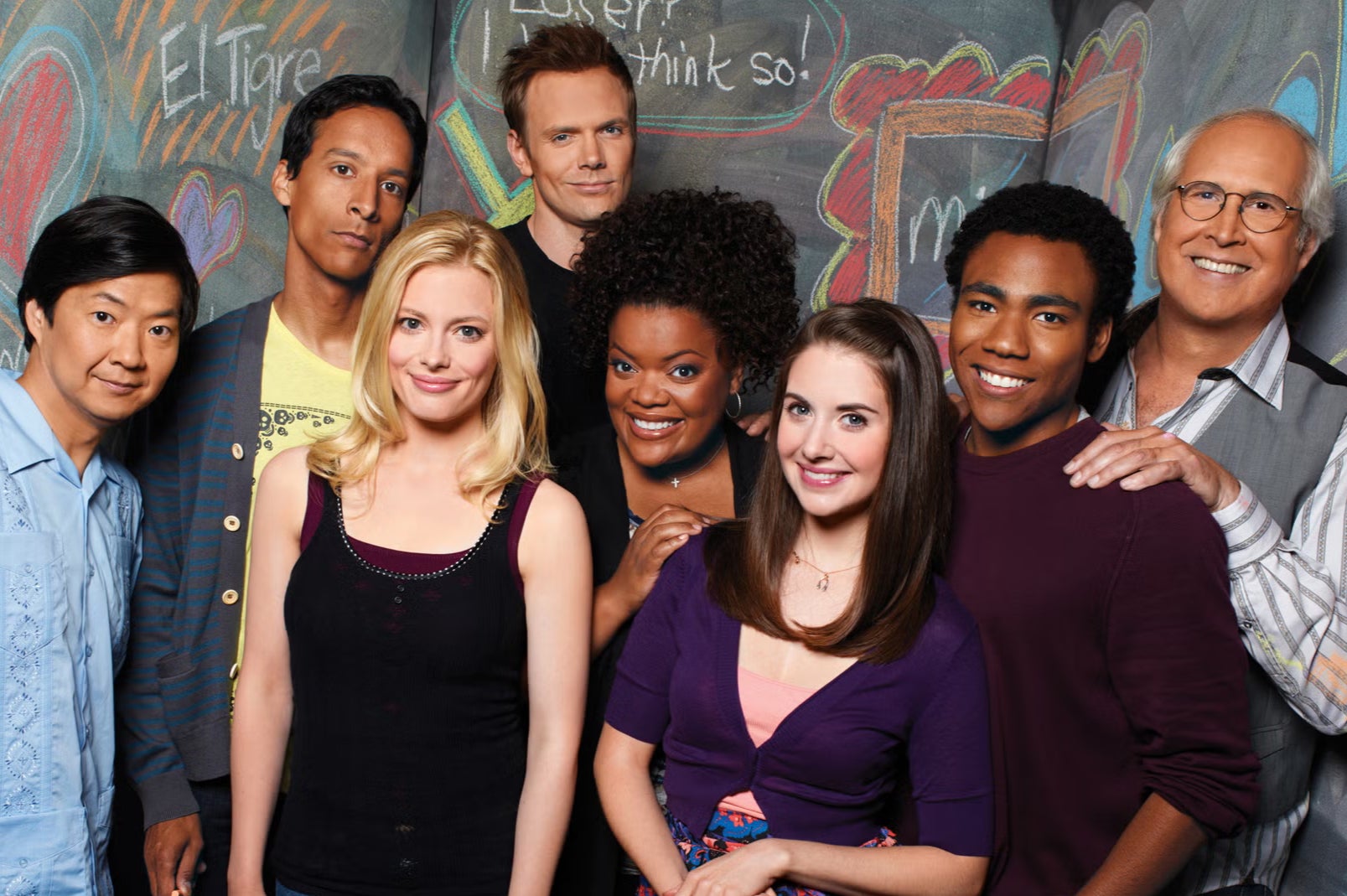
Dan Harmon’s cult comedy series Community has been providing fans with laughter for 15 years. Throughout its turbulent six-season run – a journey that saw core cast-members Joel McHale, Donald Glover, Alison Brie, Danny Pudi, Gillian Jacobs, Yvette Nicole Brown, Chevy Chase, Jim Rash and Ken Jeong endure ratings battles, firings, re-hirings, cast clashes and cancellations – the show following a gang of study group misfits swiftly acquired a die-hard fanbase thanks to its ability to dish up a heady dose of escapism. Packed with superior movie send-ups, meta-storytelling, plenty of fast-thinking flights of fancy and a whole load of heart, Community birthed its own thriving off-screen community that not only saved the show during its darkest hour but still exists to this day.
We invited Harmon and some key cast members to escape into the Dreamatorium and reflect on the rollercoaster creation and continued legacy of this masterclass in comfort viewing.
This article was originally published in April 2020. A movie continuation was announced in September 2022.
17 Sep 2009: ‘Community’ debuts on NBC. Loosely based on series creator/producer Dan Harmon’s own community college experience, it introduces us to the Greendale study group.
Dan Harmon (creator):I knew it was a different idea for a pilot even before I wrote it. The thing I learned at community college is that I had my head up my ass and I think that was related to the fact I considered myself this unappreciated TV writer. I ended up in this cramped study room with these total strangers. It was halfway through this study session that I was like, “Oh my God, I really care if these people pass their biology test.” I had this warm feeling come over me. The two thoughts I had were: I’ve been really distorted in my view of the universe and this is the kind of pilot networks are always wishing I would write.
Joel McHale (Jeff Winger): The pilot was really funny. The structure and the way the characters were introduced were so well painted – that alone lets you know the person writing it knows what they’re doing. The joke rate per page was similar to The Simpsons. I knew I could play an A-hole because I leaned into that on The Soup [the satirical talk show McHale hosted between 2004-2015] – it didn’t mean I was an asshole – just more than happy to speak my mind in every situation. I thought that part of Jeff was similar to me.
Gillian Jacobs (Britta Perry): I went to the table read and one of the producers introduced everyone – they said “this is our newest cast member, Gillian Jacobs”. I had gotten the offer on my drive down and they didn’t tell me. They announced it in front of everyone and I started crying. I guess they wanted to surprise me. It was a dramatic way to find out.
Yvette Nicole Brown (Shirley Bennett): I had a really tough pilot season the year I booked Community. The day before I was supposed to audition, I passed. I decided I was done with pilot season. That morning, I woke up and thought I should probably read the script and it was hilarious. I was like, “Oh no!” I had maybe five or six hours to learn everything I needed to learn about Shirley Bennett and prepare for this audition I had no intention of going to.
Ken Jeong (Ben Chang):Knocked Up came out in 2007. Director Judd Apatow put the outtakes online featuring a deliberately wilder version of my character and it went viral. Dan loved that scene and wrote Senior Chang with me in mind. I signed on for at least five episodes then The Hangovercame out and my profile was instantly raised. NBC asked if I’d like to be a series regular. I was a married father of two, I had just quit my medical day-job and two and a half years later I’m on a major show on a major network. It was crazy.
Alison Brie (Annie Edison):When we first started shooting, I was like, “I’m not like Annie at all!” But more and more I realised it’d be me coordinating us all hanging out at the weekend so I did share that in common with Annie. We shot notoriously long hours. We were lucky we loved each other so much because those long hours could have been a real slog. Instead they were filled with maniacal, insane joking. We were in tears laughing all the time.
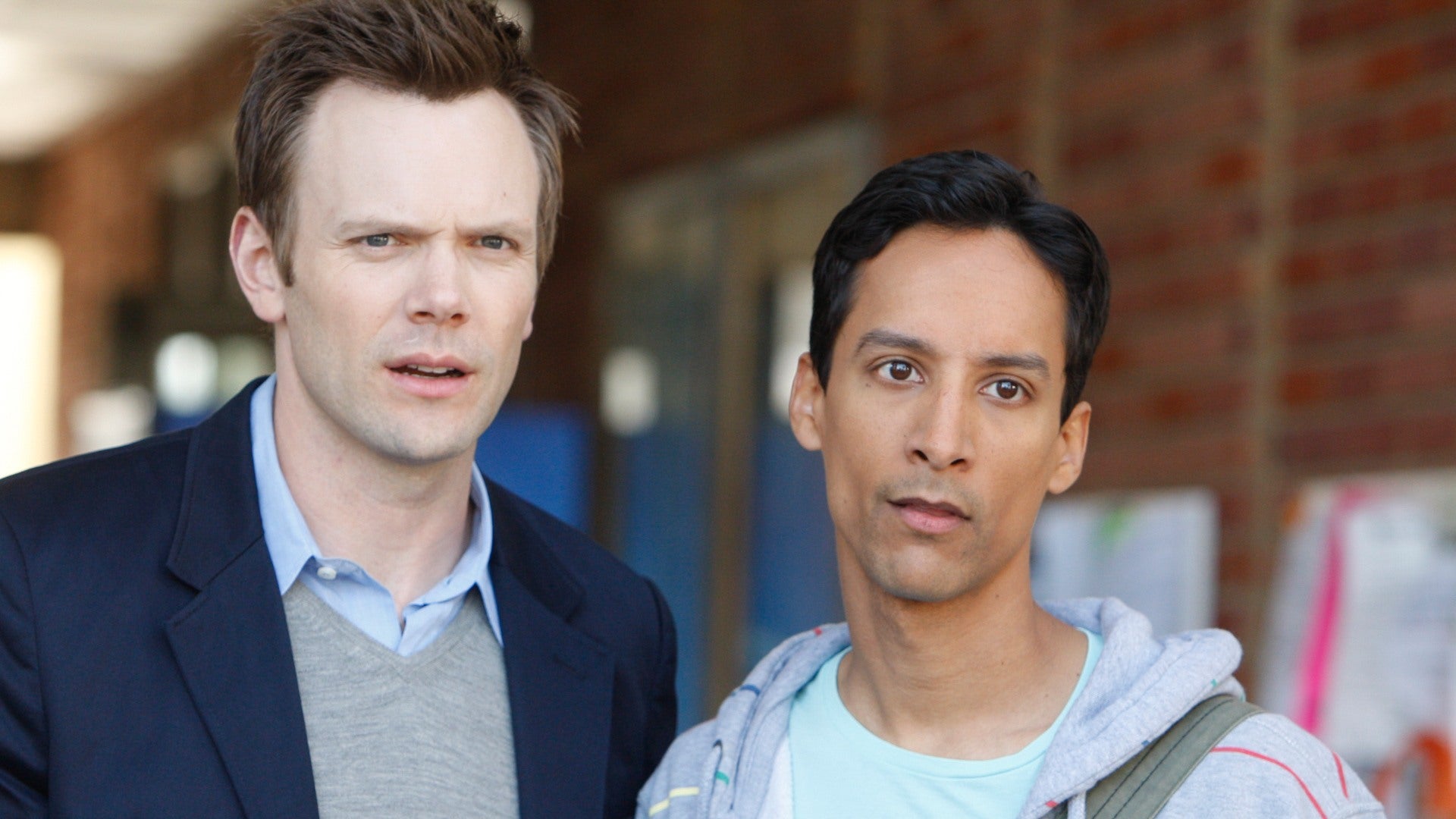
Danny Pudi (Abed Nadir):In many ways Abed was the canvas for this crazy world. People would ask me if it was difficult to memorise his monologues. The writing was so specific that once we’d established who Abed was and how he saw the world through a pop-culture lens, it became easy. It was wonderful to be on a show that could truly depart. Keeping a straight face was a challenge.
Joel McHale: Jeff’s speeches were so good. They were one of the weapons of my character so I just made sure I knew them backwards and forwards.
Jim Rash (Dean Pelton): I think Joel requested that Jeff and the Dean’s (sexualised) storyline be pushed. I do know I started touching his abs at some point and wouldn’t stop doing it whenever he entered the room. I was proud to keep finding new ways to do it, whether they used it or not. At its core, it was just a man who wanted to be liked.
Yvette Nicole Brown: When Shirley gets really serious and a little scary, that’s my mum – and the sweet version of her is another side of my mum. She was the kind of person where if my brother and I got into trouble, she’d be putting us in our place but the phone would ring and she’d go, ‘Oh hello!’ She had that duality – and I stole it. Shirley’s catchphrase – “That’s nice” – was never scripted. In the pilot, Joel did something I liked, I happened to say it and it ended up in the show. We just started throwing it in whenever I felt like Shirley would think something was nice.
Dan Harmon: Before we started shooting, the writers made a decision that Troy (Donald Glover) and Pierce (Chevy Chase) would be the Beavis and Butt-Head of the ensemble, always getting up to no good and egging each other on. It seemed like a natural fit but even the most ardent Chevy Chase supporter would say he’s a soloist. Sticking him with another person and saying you guys are going to be Abbott and Costello – it was naive.

Danny Pudi:Donald Glover and I clicked right away. One time we were doing an interview and started freestyle rapping to distract from whatever question we’d got. From that, I think Dan got inspired to write the “La Biblioteca” rap and those end-tags took off. Donald’s such a brilliant improviser. Sometimes we were just given a premise and would run with it. Yvette mentioned that Donald and I were like Bert and Ernie and the next thing you know, we’re watching YouTube videos and coming up with a bit.
The show soon hits its creative stride with a series of pop culture-inspired meta-adventures. However, off camera, long shooting hours and renewal uncertainties begin to take their toll on the cast.
Dan Harmon:We owed a handful of episodes that needed to be stand-alone. They couldn’t contribute to a serialised thing, they needed to be able to be inserted at random spots. That’s where we were able to come up with things like the Chicken Fingers Scorsese homage, the Animal House homage and of course, the paintball episode.
Alison Brie:We were delighted to realise the show was so much more than a network comedy. It was constantly pushing boundaries and challenging the classic tropes. There were little tipping points. The paintball episode in the first season was so fun. It just blew our minds like, “Oh, I didn’t think you could do this on a network comedy.” The weirder the episodes got, the more fulfilling it was. We always referred to season one’s Halloween episode as the first where everyone was gelling. Danny was Batman, weird stuff was happening and the whole group was really clicking. You could start to see what the show would become.
Jim Rash:Every time we’d have a table read, we’d see a genre-bending idea and it made it all the more exciting. Every week was almost a different show, yet the beating heart of Community was always the same.

Yvette Nicole Brown: It felt like college and every week was like getting a brand new syllabus. For some episodes, we’d get together and watch whatever movie it was based on. We watched Goodfellas in Danny’s house because we were doing the “Chicken Fingers” episode and I’d never seen it. Who signs up to do a 30 minute comedy and gets to be in an action film, a romantic comedy, a film noir or a horror film? It was ridiculous how blessed we were. People have said it was like a live action cartoon because you didn’t know where these people were going. Are they on a spaceship? In a mafia film? In Pulp Fiction? It was amazing.
Dan Harmon:I can’t remember any ideas we always wanted to do but couldn’t crack. There was one concept that was always floating in the air which was the idea of doing an episode about Jeff Winger being a shy pooper. I ended up grafting that over to [his next series] Rick and Morty.
Gillian Jacobs:It definitely felt like part of the Community experience was exhaustion. I don’t know if it made it more fun but it definitely bonded us all. We were around each other more than we were with our friends and family. Happily, we all found each other funny.
Joel McHale: The hours were insane. We were basically shooting a movie every week.
Jim Rash:Sometimes you’d see the sun come up on a Saturday after you started late on Friday. I remember shooting “Conspiracy Theories and Interior Design” and there was a screaming match where everyone gets shot. That scene was just screaming and panic, and without us all being able to joke around with each other at 3am, I don’t know if you’d be able to muster the strength to start screaming again. You stay sane together – or try to.
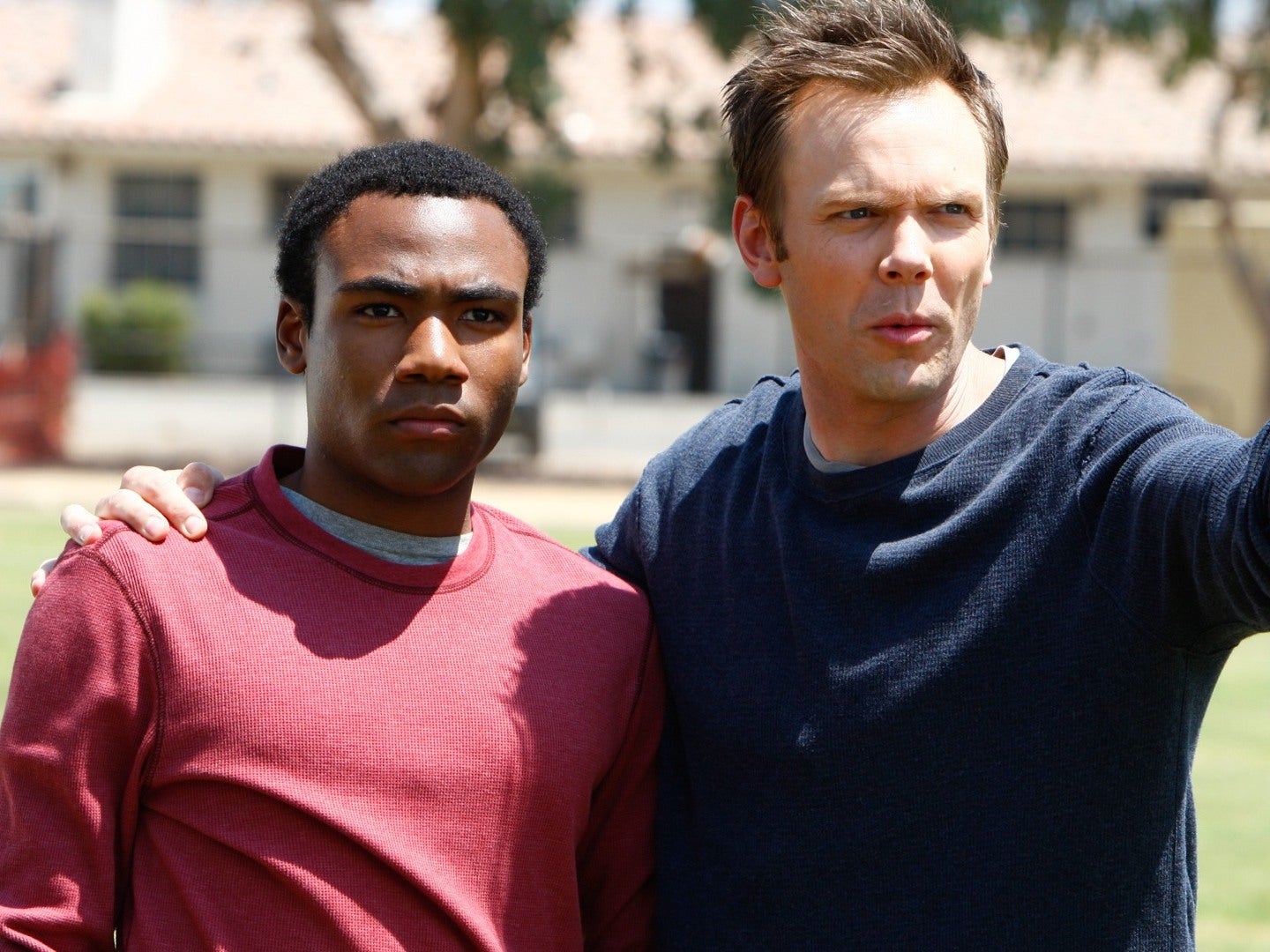
Yvette Nicole Brown: It was our war – not to make light of war, but we were in the trenches together. The things we were fighting were the hours, but we were fighting them together. We could commiserate with each other, laugh, joke and take naps with each other – and we did all those things. Had we not had each other, it would’ve been a horrible experience. Our whole life was that show.
Danny Pudi:During season three, my wife gave birth to twins at the same time our show was in its most chaotic state. We didn’t know if we were going to be renewed and each episode felt like it might be our last. I remember doing a homage to Law & Orderwhen my wife called and said, “You’ve got to get to the hospital.” It felt like a lot was happening at once. I was at the hospital in full make-up when my kids were delivered, which will be something I’ll have to explain to them one day.
Shortly after season three, Harmon is fired following clashes with NBC and star Chevy Chase. Their feud results in Harmon playing angry voicemails from Chase live on-stage during a recording of his ‘Harmontown’ podcast. Chase departs the show after the Harmon-less season four amid reports of of him disliking the show’s shooting schedule and being verbally abusive to cast members.
Dan Harmon:During season three we started breaking a story about bringing Jeff Winger’s dad into the mix and I remember getting a phone call warning me not to make it too dark. I said, “Well, I just won’t do it and if you guys ever decide to fire me, you can do the version of a father story without me.” I’m not going to break a story about Jeff Winger meeting his estranged, possibly alcoholic, con artist father with the mandate that it puts a pep in your step for people who don’t watch the show. I think more than anything, that’s the conversation that got me fired – but it was just the straw that broke the back. I’d got into the habit of saying “fire me then” to what I perceived as unresolvable conversations. It wasn’t to be difficult or like I didn’t believe they’d fire me – it was truly me just trying to resolve conflict.
Joel McHale: There was always a slight layer of chaos. Good chaos and then some bad chaos. When we lost Dan it was like losing a rudder – that was no fun.
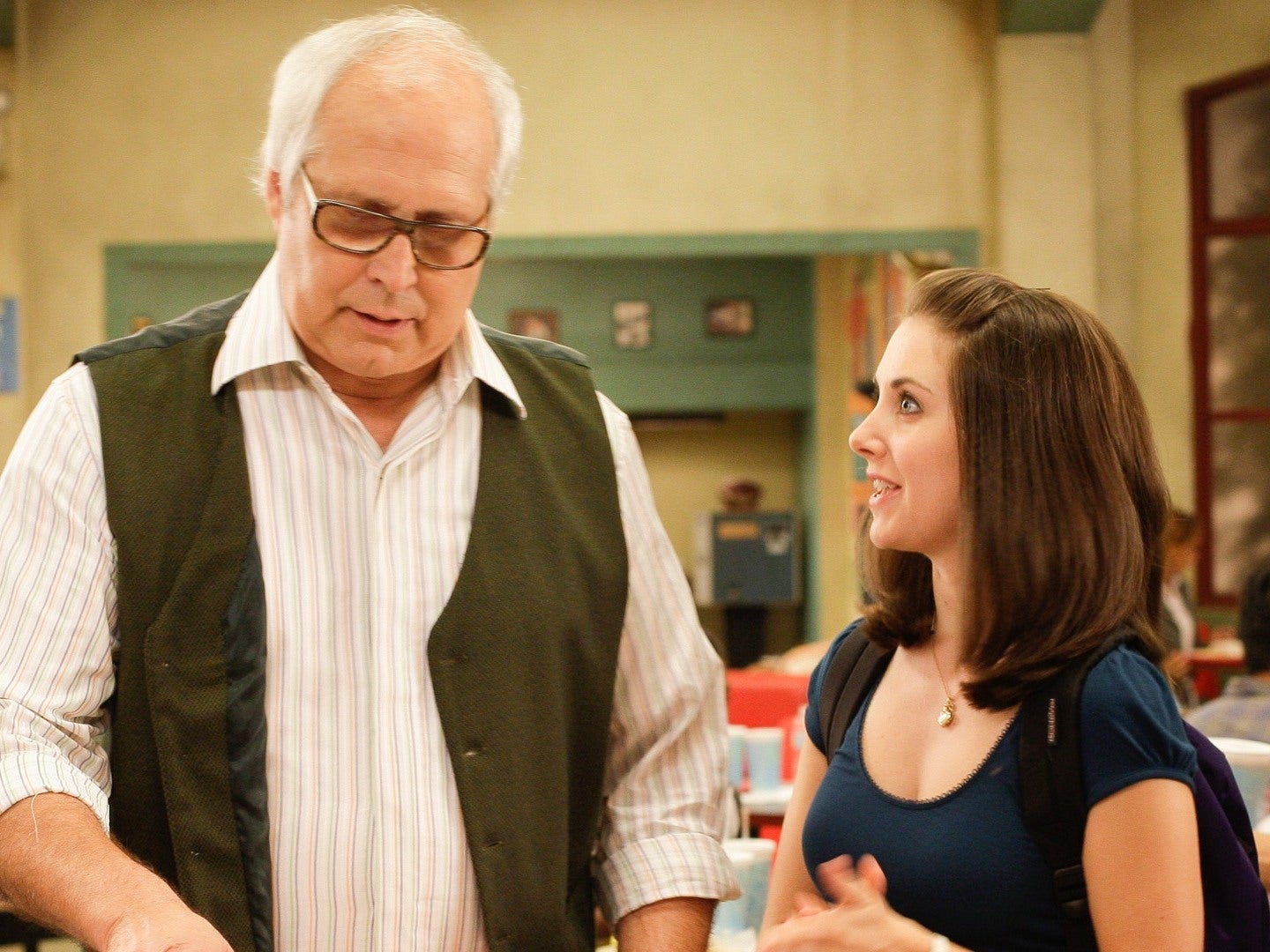
Alison Brie:The season Dan left was very depressing because we lost our leader. It was brutal. Dan’s role ended up being the person who was challenging the network and really fighting for his own ideas and to get some of these crazier scenarios on the air. When he was gone the show really did feel like it fell from grace. It dropped a notch creatively and it was horribly unsatisfying.
Yvette Nicole Brown: We felt like we were sunk because we were a ship without a captain. Even if the captain kept us out at sea for 16-hour days, he was still in charge of that ship. Regardless of everything else, Dan’s writing and the show he created were gold, so how do you continue a show that’s uniquely from the mind of one particular person? How do you go forward without him and make sure it’s as good as everyone expects? It was scary.
Joel McHale: Dan was gone first, then Chevy left. Chevy always hated the hours and didn’t want to be there for that long. I understand. When you make movies, it takes months but Chevy was never into that and ultimately exited. There’s a shot where Chevy left during an episode and never came back. He never completed the scene – he just disappears and they hoped it would be OK. Chevy has some demons and I know he’s dealing with them.
Dan Harmon:I think there was a culture gap in the sense that Chevy was coming from a world where he was a feature film star. Not only that but features were easier to work on in the Eighties. If you were a movie star you can say you’re tired and they can find it in the budget to wrap for the day. He was used to a certain work ethic and we were moving him into a hotbox where he was being told he was a cog in a machine and sometimes he could nap in his trailer but overall, he was going to be working 12 hours a day and sometimes doing 20 takes whether he thought he nailed it or not. That was always going to be alienating for him and an alienated Chevy is an alienated everybody.
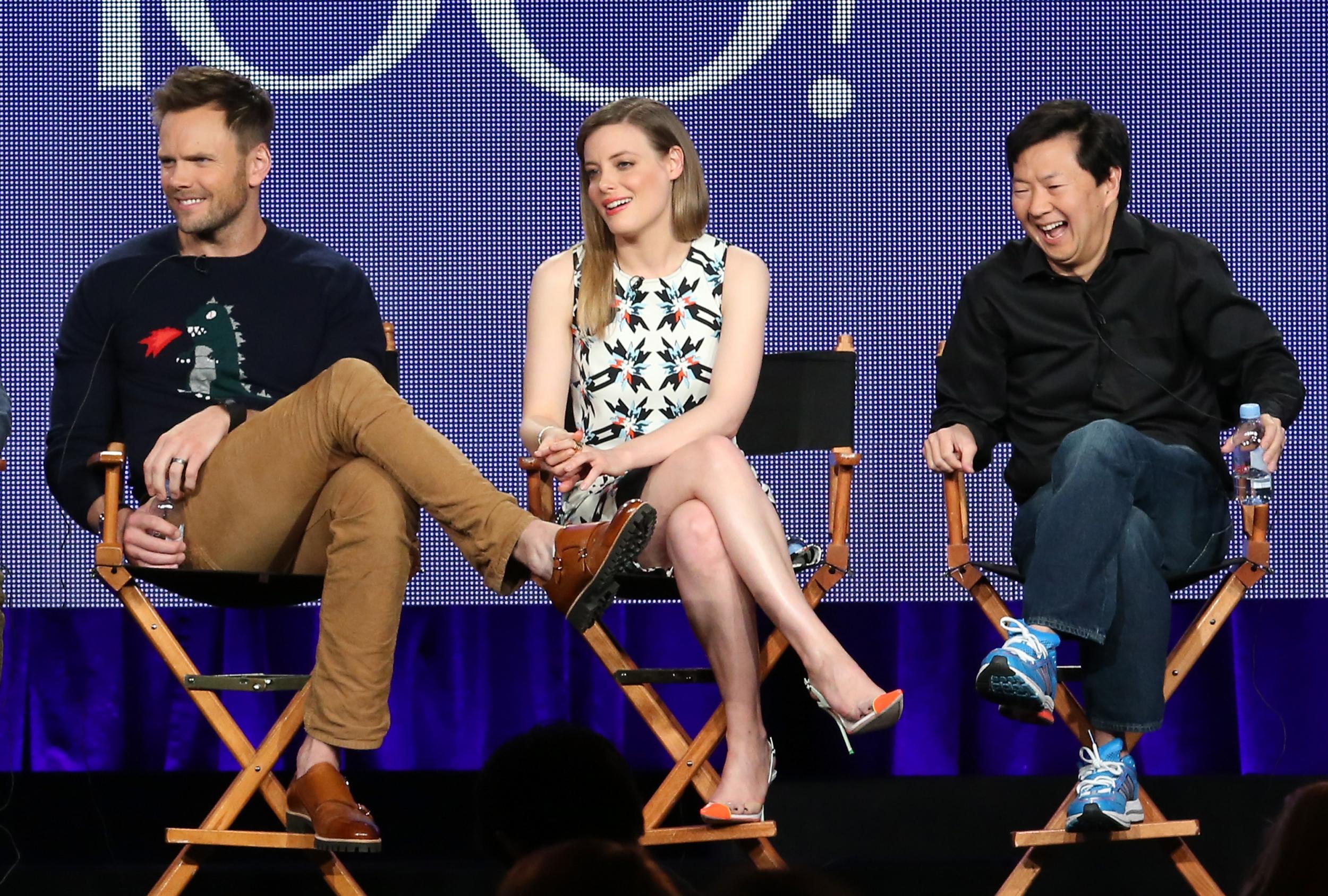
Danny Pudi:It was chaotic but also extremely normal to what our experience was already. We had been through a bunch of ups and downs. Each episode felt like it might be our last – we didn’t know what was happening until after it happened. We didn’t know whether our show was being renewed or cancelled until somebody said something on Twitter.
Gillian Jacobs:It took its toll on us. It’s a show about underdogs and we felt like underdogs as the cast of the show. The two things synced up well.
Dan Harmon: It’s important to say that I emphasise – because anything I deflect about working with Chevy was offset by how funny the guy was. Also it was only stuff I didn’t like about myself – I was a big baby too and that’s usually how it works out. You end up collaborating with people who are the shadows you cast. I was a narcissist, I was a control freak and it was therapeutic and karmic for us to have to work together – and we still like each other because we both still probably have our heads up our ass [laughs]. I also want to give a shout-out to Joel because I was not a mature grounded leader on that set. Joel really stepped up and bothered to take that role of male lead in a sitcom and extend it to the unnecessary territory of on-set patriarch. He did his acrobatic best to diffuse, soften and mend any tensions that would occur.
After an outcry from fans, Harmon is rehired before production on season five starts and re-pilots the show following his return. Soon after, Donald Glover leaves to pursue other creative goals.
Dan Harmon:Chris McKenna (writer) and I heard rumblings about Donald leaving as soon as the ink dried on the contract we’d just signed to do season five and we felt very much like the show would have no chance of survival without him. That’s not to disparage the rest of the cast – it’s just the thing was an ensemble. You could only lose so much and to lose half of Troy and Abed and one seventh of this perfect family… Donald did us the favour of staying on for five episodes – he did not do me the favour of telling me the real reason he was going was not to go on a rap tour but to in fact do a better job as showrunner and win an Emmy before me [laughs] but I’m glad he didn’t share that because it might have pushed me over the brink of giving up.
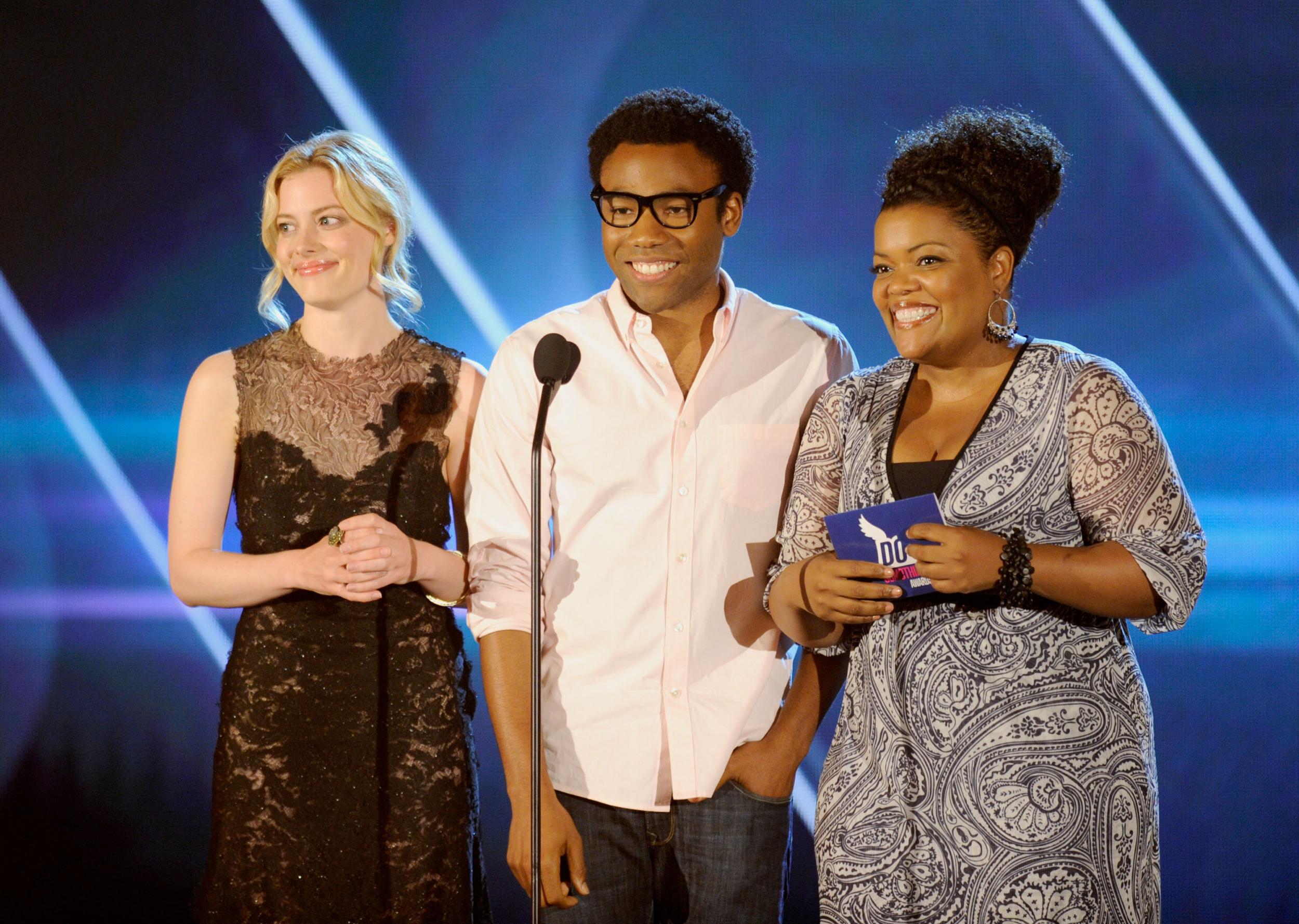
Ken Jeong:I loved the fifth season when Dan came back and reset the show. People were like, “What’s he going to do? Was season four just a fever dream?” That would have been believable in the Community cannon and I have an eternity of respect for him for respecting the reality of the characters. For him to steer it back is, I feel, the biggest feat of the show.
Joel McHale:It felt like that moment in Back to the Futurewhere Marty McFly’s parents finally kiss on the dancefloor and he stops fading away. I don’t think it could have continued after season four the way things were going but having Dan back was like having our GPS back. It was absolutely necessary to have him. I didn’t want to go back if he wasn’t back – and he came back. Whenever I see him, I hug him for it.
Jim Rash:From reading the first script of season five, there was an element of “Oh that’s it – that’s what I’ve missed!” It was like your parents coming home and you’re just glad someone’s there to make you a better dinner than what you had been making for yourself.
Yvette Nicole Brown: I was really happy Dan returned, but I feel like sometimes the guys that came in to steer the ship for that year get beat up on a little unfairly. I truly believe they did the best they could and that their goal was to keep Community alive and make a good show. People forget that had they not done it, we wouldn’t have continued. Everyone that loves season five and six wouldn’t have got those seasons without season four. Dan is a hard act to follow and I think those guys did their best. That said, we were really happy to have Dan back at the helm.
Alison Brie: Everyone was growing and changing and getting different work opportunities outside of the show so we ended up having different relationships with our own feelings about it returning or ending. As the series went on, Donald left in season five, Yvette left just before season six, obviously Chevy was asked to leave and we got new cast members for our sixth season (Paget Brewster, Keith David). It was constantly in flux but we all just learned how to live in chaos.
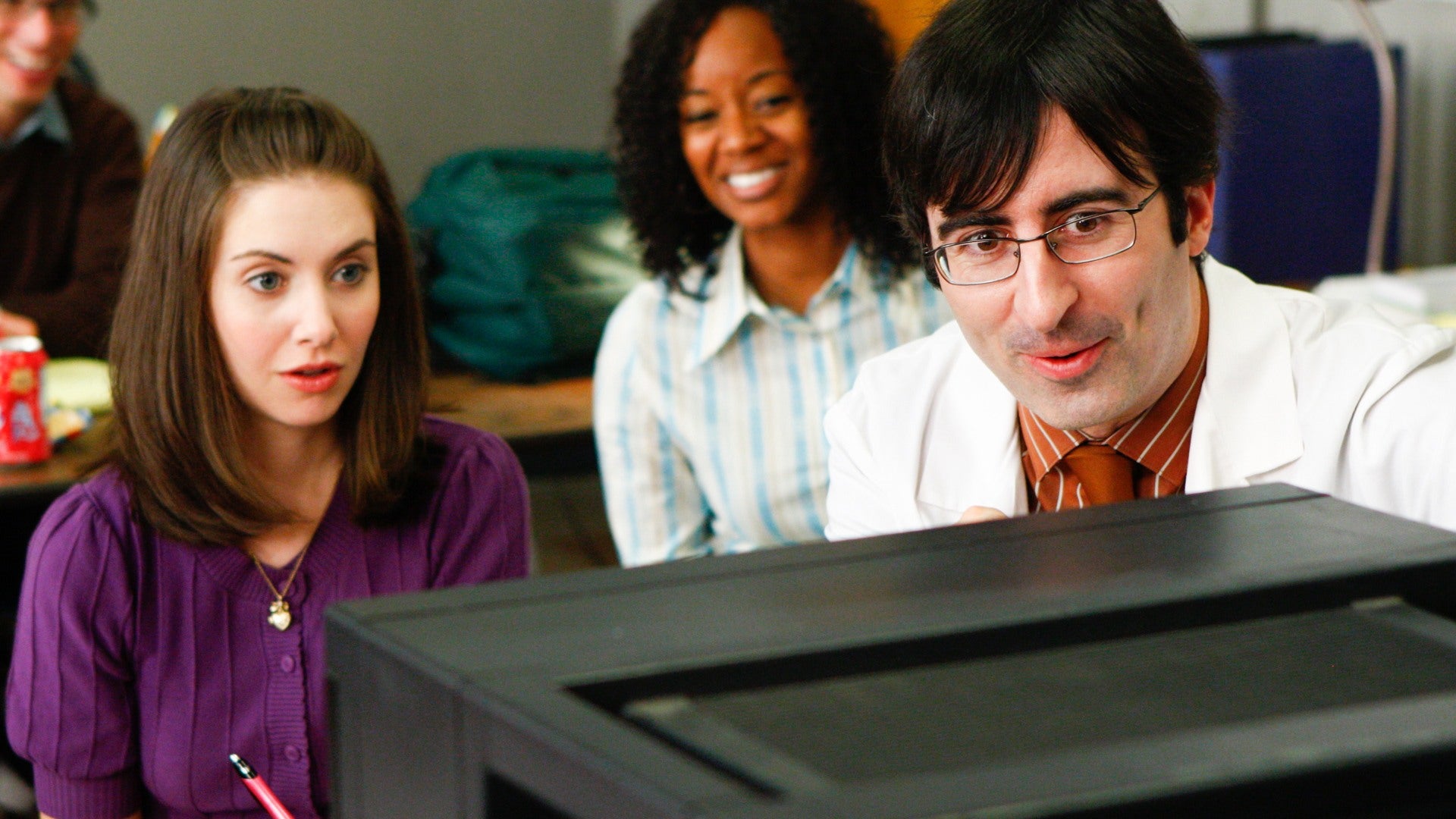
Dan Harmon:One of the biggest points of contention between myself and the studio was the show being too conscious of time passing. What they wanted was a timeless hit so these people can go to school forever but I had long since traded in on the sentimentality of believing these people are real. The biggest centrepiece of that conflict was this idea that Jeff Winger is going to finish the task he was sentenced to complete at Greendale and part of that was meeting his dad. It was important to re-pilot because during season four when I was gone, they went there. They did a dad episode and Jeff graduated. I didn’t want to ignore the fact that happened and yet they weren’t necessarily things that happened the way they would have. So coming back for season five it was important to say, “OK, we’re beginning a new show.”
Offscreen, ‘Community’ had gathered a vocal fanbase. A surprise hit at 2010’s San Diego Comic-Con, it went on to fill the event’s mammoth Hall H in 2013. When NBC axed the show in 2014, ‘Community’ fans were instrumental in its survival, petitioning online with #SixSeasonsAndAMovie.
Danny Pudi:We were in this bubble of not really knowing if our show is making an impact until we got to Comic-Con and all of a sudden we saw an audience of people quoting our show. I remember feeling like, “Wow, people are into this other than my mom, sister and brother.” I’ve never experienced anything like it.
Alison Brie: I’ll never forget our first Comic-Con and all of us being blown away by the fans and their passion. Just to shake their quivering hands and see them in tears… I felt like a Beatle!
Gillian Jacobs: We walked out and got this insane standing ovation and once again I started crying. The fans organised a fan-art show and three Communi-Con conventions – I went to all three. We have very dedicated fans and started to realise the show wasn’t just entertainment but it meant something more to people.
Yvette Nicole Brown: It was my first Comic Con and I’d never seen that many people. After we did our panel, we did a signing, and we needed security to get us through the throng of people. They knew our names, our characters and started talking about different episodes. I’d never seen anything like that. I’ve been blessed to go to Comic Con since, to moderate panels, but nothing will ever top that first experience of Comic Con as a member of the Community cast.
Joel McHale:I was at Comic-Con and somebody said people have been waiting hours to get into our panel – that’s when I first realised people actually liked the show. I didn’t figure people would dress up like Troy and Abed – it was so crazy and wonderful.
Dan Harmon: I credit it to the engineering of Abed. There’s a very valuable sitcom-saving ventilator tube with that character. Every primate wants that sense of family and comfort but you’re nagged by this very healthy scepticism because TV feels like a lie. Simply having Abed there to say every few moments “this sure feels like we’re on a TV show” – I always looked at that as making the fourth wall digestible to a millennial audience so they could lower their defences and fall in love with the show.
Community’s sixth and final season aired on Yahoo Screen in 2015 without Yvette Nicole Brown who stepped away for personal reasons. However With the show – and #SixSeasonAndAMovie – remaining popular with fans, movie talk is never far away. (Note: At the time of writing, the now-confirmed film was two years away from being announced.)
Yvette Nicole Brown: My dad was sick. He hadn’t been diagnosed but was showing signs of dementia. My mind completely shifted from doing Community – or any other show – to focusing on caring for my Dad. When we got picked up again, I knew I couldn’t do 16-hour days and take care of him. It was an interesting time. I do sometimes wish my family circumstances were different, so I could have been there with the cast for their last season. One, because I loved them all and two, because the season was funny. I watch episodes and wonder what Shirley would have done.
Danny Pudi:I don’t know if our story’s done. There’s still the movie point. We have an extremely busy group of people but we’re all very passionate about the show. The spirit of Community is still alive.
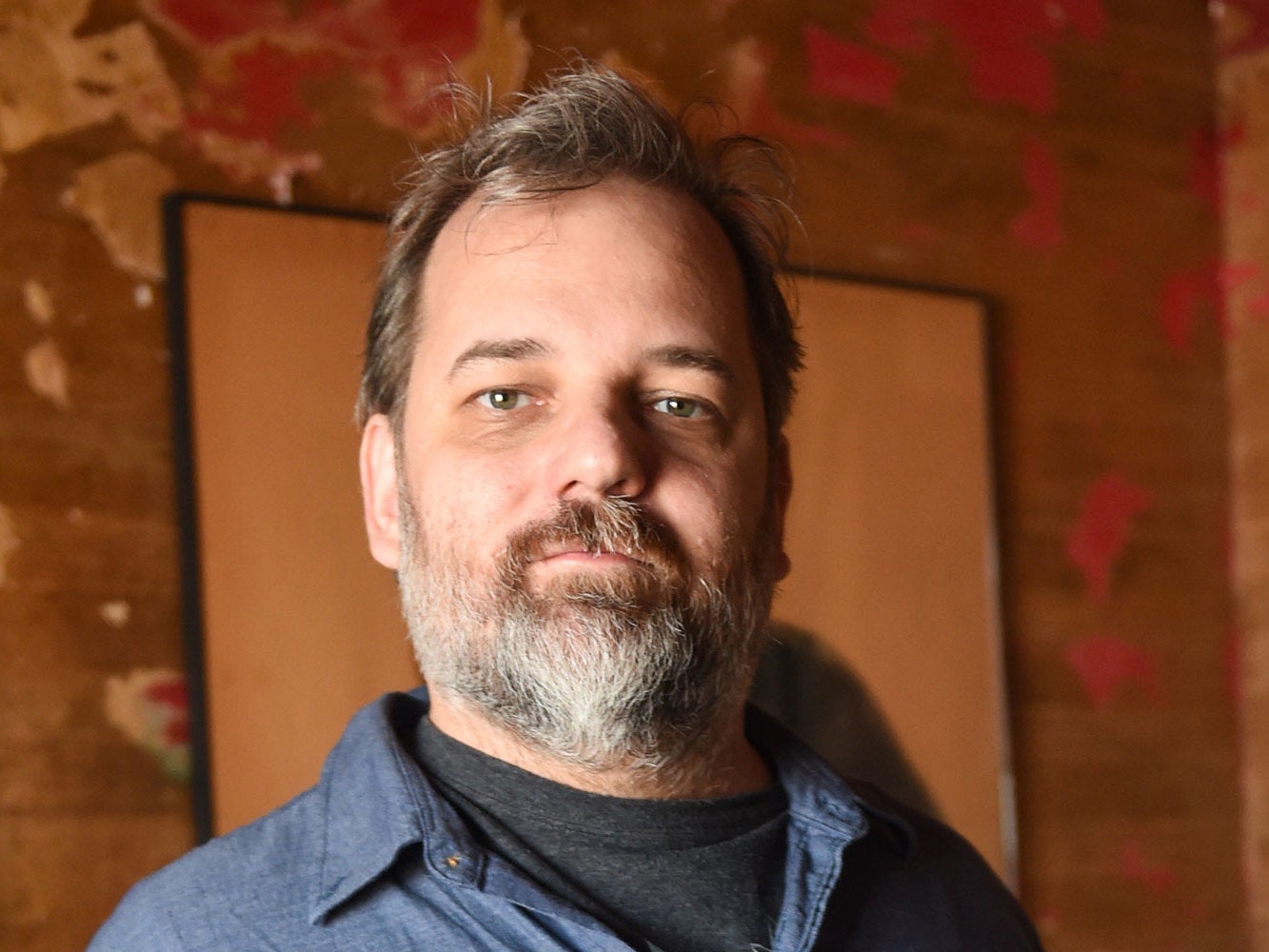
Alison Brie: There are probably endless stories to be told with these characters and certainly if Dan is coming up with the material I feel like there’s no shortage of places they can go.
Jim Rash:Dan closed it out and I felt he did it well. Obviously, everyone thought there’s got to be a movie – any of us would come back at any point, even 20 years from now – but I feel like you really can’t complain when you make six seasons with all the challenges we had.
Ken Jeong:Community opened up a whole new world for me as an actor. To channel something so positive and make that your art? Now you’re speaking my Chang-uage. I think at its heart, the biggest star of Community is Dan Harmon, this is his world and so really it’s up to Dan. If he feels there’s more story to be told, we will tell it.
Gillian Jacobs:Community changed my career. I can’t overstate how momentous it was. These are some of the best people I’ve ever worked with in terms of talent and who they are. I greatly miss getting to work with them on a day-to-day basis.
Yvette Nicole Brown: As an actor, you always hope you’ll get to be part of something that resonates and matters. Community changed my life. It changed the trajectory of my career and what I believed was possible for me as a black woman on television. There was a “before Community” and an “after Community“ and everything I’ve been blessed to do since has been because of the wonderful foundation that show laid for me. There’s definitely more story to tell. I think a movie is inevitable.
Joel McHale:Some people said, ‘Why doesn’t your character just go on?’ That seemed nuts. We had six seasons. I look back on that time and think it was the most satisfying and best part I’ve ever done – and I’ll take that any day of the week.
Dan Harmon: Certainly ideas have been kicked around. I think we can anticipate it’s going to be most difficult to get Donald to leap back into the role of this thing he probably associates with creative puberty – but I’m sure it’s not out of a lack of love for the show that he’d be hard to get back. I think pretty much everybody else is good to go and although we do have some concepts of how we would frame a return to that world, I thankfully believe the cast is willing to do it for the sake of doing it. They love each other and miss being together. I think time makes everyone look back and realise what a blessing that show was in everybody’s life.
Seasons 1-6 of Community are available to stream on Netflix now
Join our commenting forum
Join thought-provoking conversations, follow other Independent readers and see their replies
Comments
Bookmark popover
Removed from bookmarks